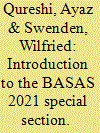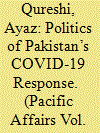| Srl | Item |
| 1 |
ID:
186305


|
|
|
|
|
| Summary/Abstract |
This special section is dedicated to the BASAS conference 2021. The conference coincided with the devastating second wave of Covid-19 in India, which started in March and peaked in May 2021. Case numbers and mortality in South Asian countries were very high and their health systems too struggled to keep up with these unprecedented times. As governments across South Asia appeared to fail their populations, a sense of crisis was shared by conference participants, many of whom were personally affected by this wave. This conference was unique in that it took place after a two-year gap due to the Covid-19 pandemic and in that it was the first fully online BASAS conference. The papers in the special section draw attention to significant areas of research in South Asia.
|
|
|
|
|
|
|
|
|
|
|
|
|
|
|
|
| 2 |
ID:
187420


|
|
|
|
|
| Summary/Abstract |
This paper takes a “state-in society” approach to understanding the evolution of Pakistan’s COVID-19 response, which was laid claim to and contested by multiple agencies within and adjacent to the state, and by multiple levels of government. The capacity of the health system of Pakistan was already overstretched by the needs of its population but in recent years it has been hamstrung by ongoing protests by the medical community concerning the privatization of public-sector hospitals, to which were added protests over the lack of personal protective equipment in the public sector. These protests resulted in frequent closures of outpatient departments at major hospitals. When the government announced a relief package to mitigate the effects of COVID-19, traders and big businesses lobbied the government to obtain the lion’s share in the form of concessions such as loan deferments and tax refunds. The government touted the unconditional cash grants program but the cash for the poor could not be disbursed effectively due to the absence of local governments at the grassroots level. As an appropriate response to the pandemic, especially in relation to the lockdown policies, was contested and negotiated among multiple actors in the Pakistani state and society, the Pakistani military emerged as a dominant force in this “field of power.”1 In this paper, I present an account of Pakistan’s response to COVID-19 as it evolved in 2020 and discuss the implications for democratic culture in Pakistan.
|
|
|
|
|
|
|
|
|
|
|
|
|
|
|
|